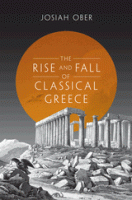
Princeton (2015) h/b 416pp £24.95 (ISBN 9780691140919)
Lord Heseltine, who in the 1980s introduced development zones into inner cities in the UK, has been waxing eloquent about the government plans to encourage a ‘Northern Powerhouse’ by devolving responsibility for development away from government to local councils, under the direction of an electable (and therefore sackable) mayor:
‘The strength of one nation lies precisely in its recognition of diversity of talent, energy, opinion and background. Setting free such strengths produces the drive and entrepreneurial spirit that creates the wealth and the explosion of culture upon which the strength of that one nation depends. Creating a Northern Powerhouse is a central part of such a vision. Linking the great eighteenth century cities provides a scale of human and economic resource equal to the world competition we face. Manchester, Liverpool, Leeds, Newcastle, Sheffield and Hull each have talent and expertise that can be enriched by improved communications with each other. Better transport enables people to move and work where their talents are more effectively engaged… All of this needs leadership and accountable governance.’
Mutate the mutanda, and that is as good a summary as one could hope for of Professor Ober’s book: for, he argues, it was the freedom, specialization, competition, innovation, entrepreneurship, developing of shared expertise and expanding markets made possible in an accountable, citizen-controlled, law-driven democratic world that explained the ‘efflorescence’ of the Greek world, i.e. its sustained economic growth, raising the living standards of more and more people, and cultural productivity, especially from the 5th-2nd C BC and to a lesser extent into the Roman period too. Indeed, he calculates that such growth did not return to the Greek world till the 20th C. Some of this in the classical period was down to the revenue Athens enjoyed from its empire, of course, but O. argues that Athens’ growth was the engine of economic growth across much of the Greek world too, together with innovations alongside the cultural in e.g. marine technology and running state finances.
This is stimulating stuff, a cheer (as O. freely admits) for freedom and democracy in today’s world where many states call themselves democratic (though none bar Switzerland anything remotely like Athens’ democracy) but are controlled by centralised authority with little interest in the law. There are problems. At times, O. impresses the stamp of the modern world a little too enthusiastically on the ancient (did the ancients really contemplate the possibility of ‘long-term economic planning’, as he suggest Sicilian tyrants should have done?). Likewise, since much of the argument hangs on conclusions arising from books and articles cited in the end-notes, one occasionally wonders whether the evidence is quite as secure as it seems; and sometimes a source is misunderstood. When, for example, he cites Plato’s Protagoras to argue that Athenians were good at ‘using the knowledge of experts for the ends of policy making’, Plato is in fact saying something quite different: that when the question is a technical one (e.g. ship-building), the people shout down anyone who is not an expert; but when it comes to determining policy, any Tom, Dick or Harry can advance a view and is listened to because there are no experts there.
That said, this is a powerful, stimulating thesis, which makes especially extensive and telling use of a huge inventory of quantifiable data about each of the 1035 Greek city-states known to have existed between the 7th and 4th C BC (An Inventory of Archaic and Classical Poleis, Hansen and Neilsen, 2004). This inventory covers each state’s e.g. settlement pattern, urban centre, city walls and monumental architecture, population, military strength, constitution, alliance membership, colonization, coinage and so on. O.’s statistics are mined from this superb source, and the data underpinning them can be found at https://polis.stanford.ed .
This energetic hymn to ‘self-governing citizen-centred polities within a decentralized marketlike ecology of small states sharing a common language and background culture’ will, like Peter Acton’s Poiesis (reviewed elsewhere on this site), raise afresh the argument about the nature of the ancient economy and the relationship between it and ‘the glory that was Greece’.
Peter Jones
